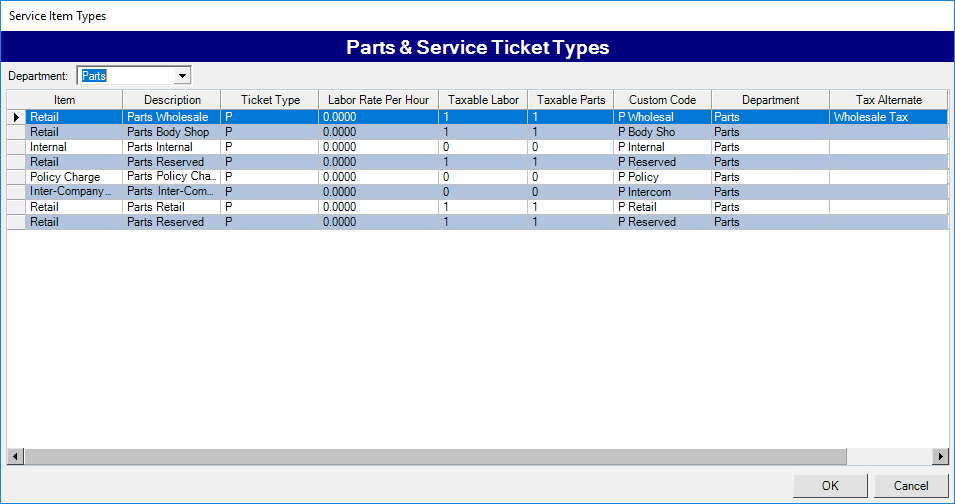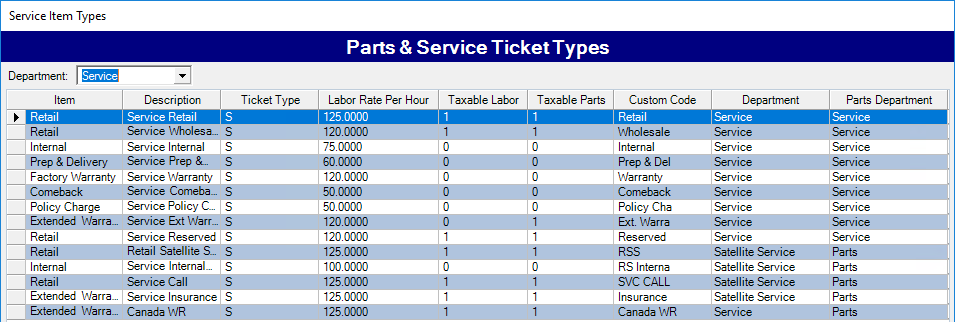Item Types are used to differentiate how service invoice jobs or parts invoices themselves will be cashed out. Item types are also used in reports.
Note: If you wish to add a repair type, like "Mobile Service", please contact the support team.
Edit a Part or Service Item Type
| IMPORTANT: Item types cannot be deleted. Please keep this in mind and be cautious about adding items types. |
Edit a Part or Service Item Type
- Open the Parts & Service module.
- Select the Edit menu from the upper left of the screen.
- Hover over Modify to expand the submenu.
- Choose the Parts / Service Item Types option. This will open the ticket types window.

- In the upper left, the parts department will be selected. You can change which department you are adding or updating types for by selecting the department in this dropdown.

- The table in the center of the window will show each of the different types.
- Update the taxable status or labor rate.
Item Types Screen
The Item column designates the type. New types cannot be added. List of types:
| Retail | Internal | Warranty |
| Comeback | Policy Charge |
The Description column is customizable. You can enter a description into the field here and when selected for an invoice, it will show on the invoicing list.
The Ticket Type comes from the department selected in the upper left. Parts will be P, service will be S, and body shop will be B.
- Service Retail- This job type is used for repairs that will be covered by the retail customer
- Service Wholesale- This job type is typically used for dealer-to-dealer or other B-2-B services
- Service Internal- This job type is used for any work done on stock units. The cost of the work will be added to the total unit cost.
- Service Prep & Delivery- This job type is used for work on stock units that are being prepped for sell. The cost of the work will be added to the total unit cost
- Service Warranty -This job type is used for repairs that will be covered by the manufacturer's warranty. The Repair order must be cashed out and ALL warranty lines need to be filled out with a minimum of the Claim Number and Net Amount. ALL warranty lines must also be checked as Submitted in order for the claim(s) to transfer to the warranty receivable account in accounting.
- Service Comeback -This job type is used to cover repairs where the customer brings their unit back for corrections to a previous repair and the dealership is going to pay for the correction/expense. The user will need to choose which department they want the expense to hit when used. This is considered a policy charge.
- Service Policy Charge- The job type is a more generic category of policy work. It is used for any job where the dealership is going to pay for the expense, such as goodwill work, non-collectable jobs, etc.
- Service Extended Warranty- This job type is used for service repairs that will be covered by an extended service plan OR an insurance policy. With this type of job payment from the 3rd party (extended warranty company or insurance company) is expected at the time of cash out.
- Service Reserved- This job type is an extra that can be re-purposed for any circumstance that isn't covered by another job type. It can be set to be treated as retail, warranty, extended warranty, internal, or policy.
If you wish to set a Labor Rate Per Hour, enter the dollar amount into this field.
If the labor or parts will be taxable for this type, enter a 1 into the applicable field. You can enter this into either Taxable Labor or Taxable Parts, or both.
Custom Codes are used in service invoice repair lines to easily choose which type the repair will be.
The Department is usually chosen to reflect which part of the dealership that the invoice or repair is performed by. Departments are created in the accounting module.
If your business has set up alternative taxes, you can choose from the list in the Tax Alternate field.
Clicking the History button will open a window to show any changes made to the item type.
| IMPORTANT: Item types cannot be deleted. Please keep this in mind and be cautious about adding items types. |